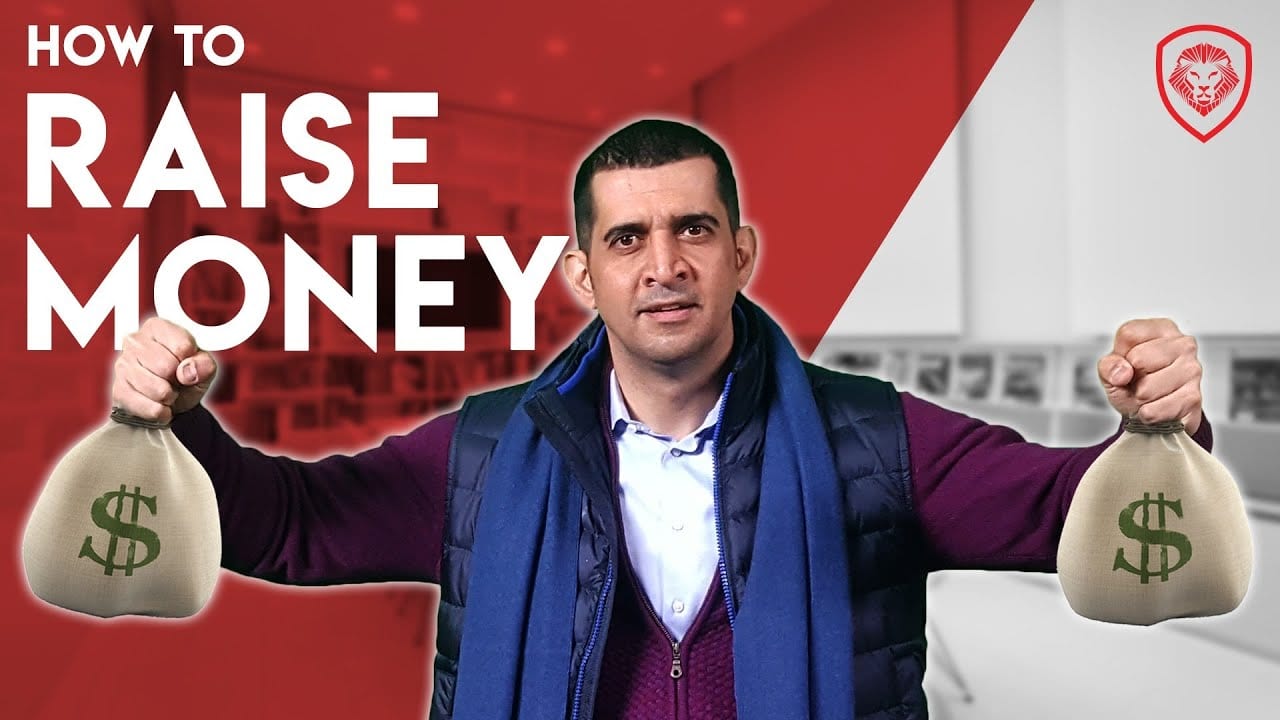Patrick Bet-David is here to answer all your money raising questions from what an angel investor is, to what is a venture capitalist, to what are incubators. If you want to start a business, you need to start thinking about how you are going to fund your vision. This will provide you with an overview of the money landscape available to entrepreneurs.
10 Questions to Ask Before Raising Money:
-
Should You Even Raise Money?
- Is your company at the point where you should even be considering raising money? Your idea could be small enough that you could bootstrap it with your associates and get it started today.
-
If You Were Not Able to Raise Money, How Would You Make Your Business Idea Work?
- If you can answer this question Angels and VC’s are more interested in your business because you know how to make your business work no matter what.
-
How Will the Money You Raise be Used?
- It easy to ask for money but when raising money, you need to put yourself in the shoes of the investor. If you were the investor would give money to your idea? You would want to know how the money was going to be used.
-
What Does an Ideal Investor for Your Business Look Like?
- Is it smart money? Is it somebody that’s involved? You to think about not only who are they as a person but also what type of relationship you want with them.
-
Do You Want to Go Big or Have Control of the Business?
- Whenever you ask for money, it comes with a lot of expectations. These are people that are not giving you money saying, “It’s okay you lost it.” These are sharks you are dealing with and they expect you to deliver on their investment. So, prepare yourself to either have control of your business or give over control to get a bigger cash infusion to take your business to the next level faster.
-
Do You Want Accountability?
- Most entrepreneurs don’t like people telling them what to do. That’s exactly what happens with VC’s. VC’s want to work with nimble entrepreneurs that are open to suggestions about their business. Can you handle that? They’re different from banks. Banks just give money and look for interest.
-
Have You Done Enough Research About the Industry?
- Don’t waste investors time by not doing your homework. You need to know what the industry looks like before you go out to raise money. It will show potential investors you are not only serious, but you know how to use their money wisely.
-
How Unique and Different is Your Idea?
- Investors are not looking for something perfectly different than everything out there, but they are looking for your business to stand out. Your idea needs to be positioned in such a way that anybody can tell how it is different than the rest of the marketplace.
-
Have You Done the Math? What is the Value Your Company?
- The moment you present bad math, investors are going to walk away. They are expecting you know how much you are valued at as well as what percentage stake their money buys them.
-
Are you building to sell?
- Investors want to know if they can make their investment back plus interest in 5-7 years or do you have plans to get it funded and try and sell it once it is ready to launch? Some VC’s don’t want to invest in businesses that are built to sell. You need to do your homework.
The 6 Ways to Raise Money
-
Bootstrap
- Using your own money to start your business. You can use your own cash savings or ROBS. (Rollover for business startup)
- Take money out of your retirement (401k) account and put it into your business without paying taxes.
- This works best with those with over $50k in your retirement account.
- HELOC & Credit cards
- 25% of business owners use a HELOC to start a business. (Taking money out of your mortgage.) Don’t use credit cards as some people suggest. If you are building a big company you will need banks down the line, don’t destroy your credit building a business with credit cards alone.
- If you bootstrap you get to keep control longer and you have a more solid proven product to present to investors. You keep more equity and give up less later on.
- Using your own money to start your business. You can use your own cash savings or ROBS. (Rollover for business startup)
-
Traditional Bank or S.B.A Loan
- It’s the slowest or the most difficult one to do because you will need:
- Steady Income
- Credit Over 700
- Equity in a Home
- Industry Experience and a Business Plan
- The SBA Program has two options which are:
- Community Advantage Loan in which you can receive up to $250k
- Microloan program which you could receive up to $50k from, but you must invest 30% of your own money in the business to qualify for this.
- It’s the slowest or the most difficult one to do because you will need:
-
Crowd Funding
- You go on to websites like Fundable, Kickstarter, and Indigogo present your business plan to your audience and they will donate small amounts to fund your idea. This is good for prototype products.
- To encourage bigger amounts, you offer rewards for larger dollar amounts and after the campaign is over a few of these sites take their own cut. So be aware of that.
-
Incubators and Accelerators
- Organizations geared toward speeding up the growth and success of startup and early-stage companies. You join them in a big office with other entrepreneurs like yourself and they mentor you and invest a little bit of money. It allows for collaboration with other business owners. They’re often a good path to different types of capital from angel investors, state governments, economic-development, and other investors.
-
Angel investors
- What is an Angel Investor? An individual wealthy person investing their own personal money. (Less than a $1,000,000 investment)
- They can be Warm Market: Friends and family.
- Family can include a rich dad, uncle, aunt, friends, or your best friend’s dad who likes you. When dealing with friends and family, set the expectation up front. Be transparent: “I need $25,000 and I want you to know that you won’t see any return for at least 3 years”. If you get some warm market investors that opens up the possibility of cold market investors coming in after them.
- Cold Market: Someone you don’t know.
- Cold Market investors like to see if your friends and family support the idea, if you have put your own money into it, or if they know that you’re going to do this with or without them. They want to see what you have done so far before considering investing. They need to feel like you can deliver a return on their investment.
- They can be Warm Market: Friends and family.
- What is an Angel Investor? An individual wealthy person investing their own personal money. (Less than a $1,000,000 investment)
-
Venture Capital (VC’s)
- What is a Venture Capitalist? A business who holds private equity that’s been invested in other private companies. They will generally demand a board seat. They usually come in with over $1,000,000 investments. Ideally, you’re looking for Series A funding from them.
- They offer more favorable rates than revenue-backed funding
- They want to have a relationship with your other investors.
- Silicon Valley Bank is venture debt.
- What Angel Investors and & Venture Capitalists are looking for? ( they are more demanding)
- Massive returns 10X at the very least.
- Returns in 5 to 10 years. Most won’t push it to 10, so 7 is the sweet spot.
- A coachable CEO
- A Strong team with a Founder with a vision and also team members with technical skills. They want to see the complete package, not just you.
- An idea with key differentiators
- If you take VC money, you’re committing to an exponential growth of the business.
- Looking for VC money can be a full time job. It can take upwards of 6-12 months. Can your business survive during that period?
- What is a Venture Capitalist? A business who holds private equity that’s been invested in other private companies. They will generally demand a board seat. They usually come in with over $1,000,000 investments. Ideally, you’re looking for Series A funding from them.
Different Ways of Gathering Leads
- Through Your Mentors
- Take those 10 questions to your mentors and see if they can help you find a credible person. Bringing those answers proves you are serious.
- Angel Lists.
- LinkedIn and different sites have these lists or Google for them.
- Local Universities
- Start with the school you graduated from or what every top-tier local schools around your area.
- Social Media Outreach
- Some of these people are active on social media and a lot of groups exist on social media that can help you get in touch with contact people.
How to Approach a Cold Angel Investor. Send An Email Following These Guidelines:
- Do research on the person you’re sending an email to. Make sure the email is short, this is just an introduction after all.
- Don’t do a copy and paste type of a message.
- Make it personable, reference a book or an interview they did that you watched or mention something you have in common or admire about them.
- What to include in the email:
- The connection
- Who you are
- The Idea
- Promo/link
Sample email:
“Dear John, I really enjoyed your book/podcast that you did, especially chapter/the part where you talked about the importance of being focused on one sector at a time. I am a (enter age) graduate of (Insert school) or executive of Google/Snap Chat/Merrill Lynch, based out of (City, State) who’s working on an idea to (short description)”.
Describe what you’re doing in 1-2 sentences. One sentence is better than two. If possible, a link of what you’ve built so far.
How to Increase the Chances of Having Professional Angel Investors Listen to You:
- Have a person who introduces you to them. It goes a long way to legitimizing you.
- Find out if someone in your network knows someone you want to get a meeting with.
- Be patient.
The Best Way to Raise Money:
Build a real business.
Use your own money.
Don’t beg. Attract.
Let the money come to you.
Subscribe to Valuetainment
Visit the official Valuetainment Store for gear
About Valuetainment:
Founded in 2012 by Patrick Bet-David, our goal is to impact entrepreneurs around the world through value and entertainment. We are the #1 channel for entrepreneurs because of the best interviews, best how to videos, best case studies and because we defend capitalism and educate entrepreneurs.
To reach the Valuetainment team you can email: marketing@patrickbetdavid.com
Follow Patrick on social media:










